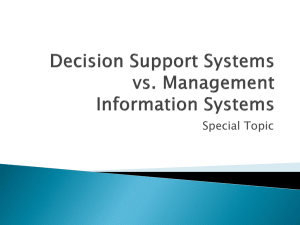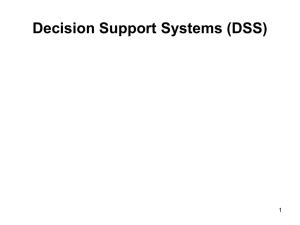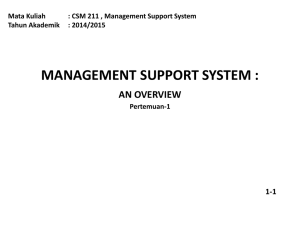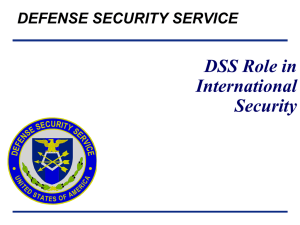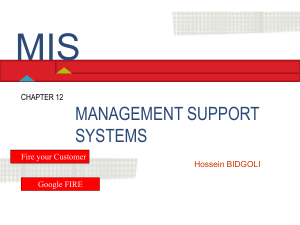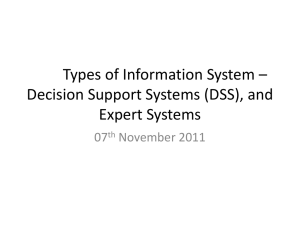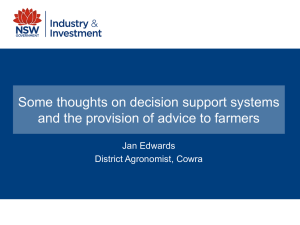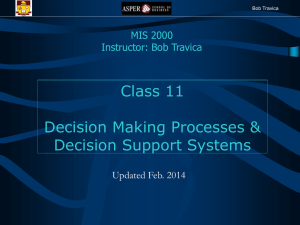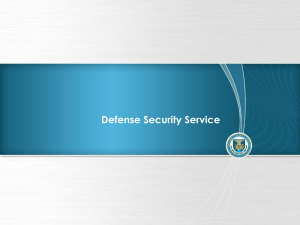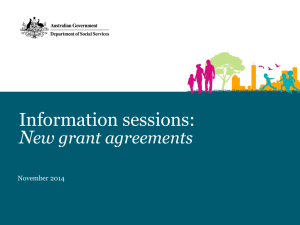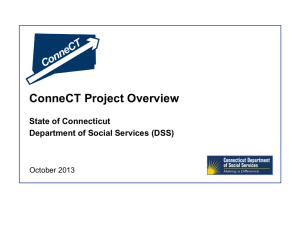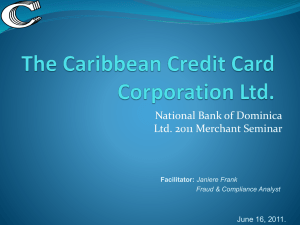Weather Emergencies - Vice-President Finance and Administration
advertisement
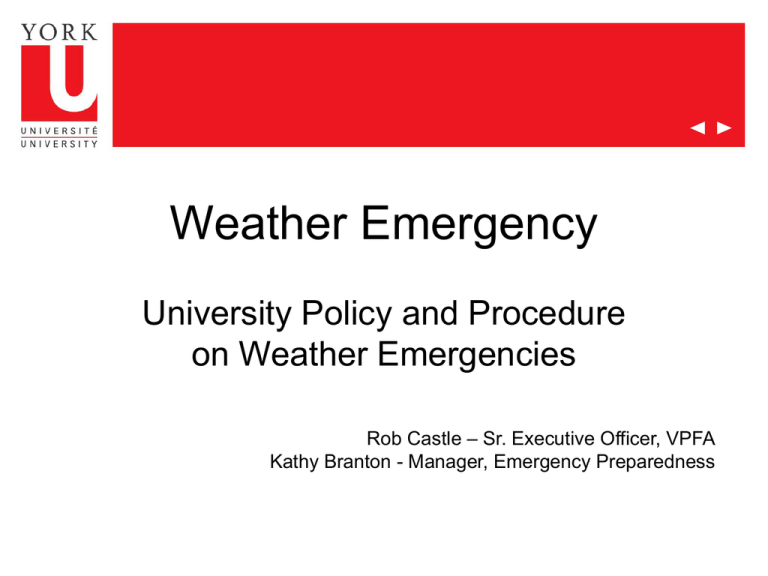
Weather Emergency University Policy and Procedure on Weather Emergencies Rob Castle – Sr. Executive Officer, VPFA Kathy Branton - Manager, Emergency Preparedness Weather Emergency Procedures Agenda 1) Decision Making Process 2) Check List 3) Dissemination of Information 4) Suspension Criteria 5) Individuals Performing Critical Functions 6) Resumption of Operations 7) Special Events 8) Questions 2 Weather Emergency Procedures Decision Making – Weather Watch The Director Security Services (DSS) and the Senior Executive Officer, Vice-President Finance and Administration (SEO-VPFA) assess the potential impact on University operations of a weather emergency being declared : DSS and SEO-VPFA notify or consult with key decisionmaking and communications personnel and places them on alert DSS and SEO-VPFA initiate a weather watch, which may require the suspension of the University’s normal operations and programs 3 Weather Emergency Procedures Decision Making – Weather Watch continued DSS and SEO-VPFA provide the VPFA with regularly updated reports and continue the Weather Watch until a decision is made to either declare Weather Emergency or to discontinue the watch DSS instructs the Security Control Centre to update Emergency Mass Notification Systems, (including web site, 416-736-5600 – the University’s Emergency and Information line, LCD screens and the mobile safety app) with the appropriate message 4 Weather Emergency Procedures Decision Making - Assessment continued DSS and SEO-VPFA assess the impact on University Operations of a weather emergency being declared by: DSS consults with the following – – – key decision and communications personnel Directors of Maintenance, Energy Management, Grounds & Custodial Director, Media Relations The SEO-VPFA will also advise senior decision-making personnel and place them on alert, including: – – – – University Registrar VP Academic & Provost Vice Provost Students SEO VPA&P who will consult with the directors of Miles S Nadal Downtown Management Centre and the Osgoode Professional Development Centre Weather Emergency Procedures Decision Making – Weather Emergency continued The decision to declare a Weather Emergency is made by the VPFA, upon recommendation by SEO-VPFA and DSS and after having consulted with, where possible, the President and, the VP Academic & Provost and the Vice Provost Students. The Chair of Senate is consulted in situations where academic classes and examinations are affected. Once the declaration has been made by the VPFA, the DSS initiates emergency mass notification systems and the emergency communication tree, including the date and time of the declaration. NOTE: The annual updating and maintenance of the University Wide Communication Tree via a web-based tool now managed through Office of Emergency Preparedness 5 Weather Emergency Procedures Decision Making – Weather Emergency continued A decision to declare a weather emergency may be enacted AT ANY TIME. Key decision points: by 5:30 a.m. to commence day operations, classes and exams by 5:00 p.m. for evening classes, exams and activities by 9:00 pm. to suspend night operations 6 Weather Watch Resources Weather Watch – Internet Tools Environment Canada Weather Office http://www.weatheroffice.gc.ca/canada_e.html U.S. National Oceanic and Atmospheric Administration's National Weather Service http://www.nws.noaa.gov/ Ontario Ministry of Transportation: Compass Cameras http://www.mto.gov.on.ca/english/traveller/compass/ camera/camhome1.shtml 9 Media Announcements Initiated by Media Relations (Communications & Public Affairs) To all local media outlets, including by not limited to: Radio • AM – 590, 640, 680, 1010, 1050, 1540 • FM – 91.1, 92.5, 93.5, 97.3, 98.1, 99.9, 102.1, 104.5, 107.1, CBC Radio Canada Television • City TV, CP24, CFTO TV, Global TV, CBC Canada Now/Toronto Desk, A Channel, and the New VR. 11 Suspension Considerations How much snow is on the ground? What are the GTA / Toronto road conditions? Is it currently snowing? What is the anticipated accumulation / forecast? Are Glendon or downtown operations affected? Are there any other educational institutions closed (or significant closures, e.g., School Boards) in GTA / path of storm? What is the public transit situation? Are buses/trains running? How far behind schedule are they? 13 Suspension Considerations continued Did it rain prior to the snowfall? Has it rained since the last snowfall? How many plows are on campus? When will the plows be on the road? Can the campus roads/ parking lots will be accessible? Given the above - can the University operate? 14 INDIVIDUALS PERFORMING CRITICAL FUNCTIONS Individuals performing critical functions include, but are not limited to, specified sections of: Security Services CSBO Grounds & Vehicles, Maintenance & Energy Management; University Information Technology (UIT), including Network Operations and Telecom. Employees in these units are guided by the Emergency Operating Procedures established by their respective Departments. The senior manager in each unit is responsible for providing updated copies of these procedures, as required. 15 Resumption of Operations The VPFA decides when a Weather Emergency is lifted. The DSS records date and time of decision and initiates the emergency mass notification systems and emergency communication tree accordingly The DSS notifies the Security Control Centre Supervisor who, in turn, notifies all Managers / Supervisors of individuals performing critical functions to resume normal operations. Decision-making follows same consultation and process. 16 Faculties, Departments and Operating Units All Faculties, departments and other operating units are required to develop their own local procedures (eg. Unit Emergency Sub Plan) to ensure that, whenever possible, all staff, faculty and students are informed of the closure of offices, cancellation of classes and postponement of examinations. Deans and department heads are responsible for ensuring that their respective internal “communication trees” are updated by October 31st of each year and copies provided to: Office of Emergency Preparedness. 17 Special Events All special events that are planned to take place when a weather emergency is in effect are cancelled unless: The event is already underway and participants are not required to move outside between buildings; or The event is part of the Schulich School of Business Executive Learning Centre; or The organizer receives written approval from the related Vice President who will consult with VPFA prior to making a final determination 18 Special Events Each division, Faculty and department is responsible for notifying organizers of scheduled events of the weather emergency Where applicable, organizers shall notify the Security Control Centre of events that are proceeding in accordance with Vice-Presidential approval and provide names and contact information for follow up contact, if required, during the weather emergency. NOTE: The appropriate VP will email approval to SEO-VPFA who will forward it to the SCC. Event organizers may contact the Security Control Centre to obtain up-to-date information regarding campus road and parking lot conditions Special Events Examples of cases where event organizers might seek approval to continue with their events: – Conferences – where participants are already here on campus and are not required to travel between buildings – Sporting events - if the teams and all participants are here, having travelled distances to compete, there may be significant cost in re-scheduling, and it may be safer to hold the event than send everyone back on the road – Professional development courses (e.g., Osgoode Downtown Centre), where professionals have easy underground and subway access VP approval is required for these events. 19 Limitations These procedures are not intended to cover all possible eventualities. It is assumed that the decision-making and relevant communications will be adapted, as appropriate, to suit the circumstances. It cannot be assumed that all individuals who may be coming to campus or on campus at the time of a Weather Emergency can be notified of the cancellation of classes and / or postponement of exams. 20 Right or Wrong ? Regardless of the University’s decision during a winter storm, many may not agree with the decision, such: Those who have a long commute or those insecure about driving in winter conditions Those who have organized major events that are being staged, or Administrators and Senate/Faculty leaders who are concerned about the finite period of time available to deliver the curriculum and/or to stage examinations 21 Weather considerations with no suspension Winter Storms and Personal Safety Concerns When there is snow activity and a decision is made not to suspend University classes and programs, University students and employees should recognize that the commute will be longer, based upon the travel conditions. Conditions and circumstances will differ from institution to institution, so York does not close because U of T, McMaster or Humber College decide to do so, though we do consult with them and factor their status into our decision making. 22 Weather considerations with no suspension Winter Storms and Personal Safety Concerns The individual commuting circumstances of every community member cannot be taken into account, so it is incumbent on individuals themselves to determine whether or not they can safely commute. This is an individual responsibility Employees have the option of calling in and making arrangements with their manager or department chair for alternative coverage or fulfillment of their duties – i.e., using a vacation or personal day 23 Weather considerations with no suspension Winter Storms and Personal Safety Concerns The University does have provisions for students whose individual situations require them to be absent during a scheduled class or examination (contact Office of the Registrar) Many course instructors now communicate directly with students in their classes (via e-mail, Moodle, etc.) when they decide to cancel a class – whether the University declares a weather emergency or not Likewise, students notify course instructors via e-mail, text message and Moodle when they are unable to attend 24 Questions ??? 25
